How Schools Play a Critical Duty in Shaping Future Leaders and Trendsetters
By integrating project-based discovering and interdisciplinary studies, academic institutions test trainees to evaluate and synthesize intricate details. Teachers offer as mentors, assisting trainees and nurturing their capacity, while extracurricular activities even more establish management skills and resilience.
Fostering Critical Thinking
In today's swiftly progressing globe, promoting essential assuming within universities has come to be extremely important. As culture faces increasingly complicated global difficulties, the capacity to examine, review, and synthesize details is necessary. Schools play a critical function in developing these abilities, preparing pupils to navigate and resolve complex problems with notified, reasoned decisions.
To cultivate important reasoning, teachers employ various pedagogical techniques that urge energetic discovering and intellectual engagement. Class discussions, problem-based knowing, and Socratic examining contribute in advertising reflective and logical thought processes. By testing students to interrogate assumptions and consider numerous viewpoints, these approaches guarantee a deeper understanding of topic beyond rote memorization.
In addition, integrating crucial thinking across the curriculum strengthens its value and applicability in diverse contexts. Topics such as mathematics, science, background, and literary works each offer special opportunities to create students' critical faculties. Evaluating historic occasions calls for assessing resources and recognizing context, while clinical inquiry demands extensive hypothesis testing and evidence-based thinking.
Ultimately, instilling important believing abilities in students equips them with the cognitive tools essential for lifelong learning and flexibility. It is via this foundational competence that future leaders will certainly have the ability to introduce, fix problems, and add meaningfully to culture.
Encouraging Creativity
Accepting creativity within educational frameworks galvanizes pupils to believe past traditional borders and explore ingenious remedies. By integrating artistic endeavors and creativity workouts into the curriculum, schools grow an environment where creativity and creative thought are valued. This approach not just improves the educational experience yet additionally gears up students with the ability to take on real-world obstacles in novel methods.
University can promote creativity via varied means such as project-based discovering, interdisciplinary studies, and the unification of arts and technology. Project-based discovering, for example, encourages students to use their knowledge in sensible, often joint, tasks that demand creative problem-solving skills. Interdisciplinary researches allow pupils to draw links in between various topics, consequently expanding their perspectives and boosting their innovative capabilities.
Furthermore, supplying students with opportunities to involve with arising modern technologies, such as coding and digital style, further nurtures their innovative possibility. These activities prompt students to experiment, fail, and repeat, which are crucial elements of the innovative process (Save Temecula Schools). By keeping an encouraging setting where testing is motivated, schools can make sure that pupils create the self-confidence to seek innovative ideas
Essentially, supporting imagination in educational setups is important for shaping future leaders and trendsetters efficient in dealing with complicated worldwide issues with ingenuity.
Supporting Cooperation
Carrying out group-based discovering modules and cooperative tasks allows trainees to experience the dynamics of synergy firsthand. This not only prepares them for the joint nature of modern work environments however also find more info supports management high qualities as they often have to handle roles such as task managers or group organizers. Additionally, cooperation in the classroom can damage down social obstacles and advertise inclusivity, making certain that each student really feels valued and heard.
Moreover, incorporating modern technology can even more sustain collaborative efforts. Tools like shared electronic work areas and interactive platforms make it possible for trainees to collaborate efficiently, also outside the classroom. As students develop these collective abilities, they are much better geared up to deal with complex obstacles and innovate, preparing for their future roles as pioneers and leaders.
Function of Educators as Advisors

Mentorship includes individualized focus, where teachers determine and nurture individual strengths and address weak points. Save Temecula Schools. Via one-on-one communications, educators can tailor their suggestions and assistance to satisfy each pupil's distinct requirements, promoting a feeling of self-confidence and durability. This tailored approach grows a growth frame of mind, motivating students to view failures as chances for finding out and growth
In addition, educators work as role models, showing the values of willpower, stability, and empathy. Their mindsets and actions give a plan for pupils to mimic, instilling a feeling of ethical duty and social recognition. By creating a helpful and inclusive class environment, instructors allow pupils to create social abilities that are important for reliable leadership.
Essentially, the mentorship supplied by teachers lays a foundational structure for the development of future leaders, equipping them with the knowledge, abilities, and values required to master an ever-evolving world.
Impact of After-school Activities
When incorporated effectively right into the academic structure, after-school activities dramatically boost trainee advancement and leadership capacity. These activities provide trainees with opportunities to discover rate of interests beyond the conventional curriculum, cultivating a well-rounded ability. Clubs, sports teams, and arts programs grow crucial qualities such as team effort, time management, and strength. Participation in these activities typically calls for students to take on duties, consequently supporting their management capacities.
In addition, extracurricular involvement encourages creativity and development. Students participated in drama, songs, or discussion clubs learn to assume seriously and technique issues from diverse viewpoints. These experiences impart confidence, allowing pupils to voice their concepts and take initiative in numerous settings. see this By working together with peers from different histories, pupils likewise create compassion and communication skills, essential pop over to this site attributes for future leaders.
Research indicates that pupils entailed in such programs often tend to have higher qualities and much better presence records. Thus, schools that prioritize a well balanced strategy to education, incorporating durable extracurricular programs, are extra likely to create innovators and leaders furnished to satisfy the difficulties of the future.

Final Thought
To conclude, schools considerably shape future leaders and pioneers by nurturing crucial reasoning, creativity, and partnership among students. Engaging instructional approaches such as project-based discovering and interdisciplinary researches play a vital role in this growth. Teachers, serving as mentors, provide essential support and support, while after-school activities even more enhance leadership possible and durability. By fostering an encouraging setting that values individual staminas and team effort, institutions furnish trainees with the required skills to navigate future challenges and drive advancement.
As students develop these joint skills, they are better geared up to tackle complex difficulties and introduce, laying the foundation for their future duties as leaders and pioneers.
By promoting crucial reasoning and analytic abilities, teachers assist pupils navigate intricate difficulties, preparing them for management roles in various areas.
By teaming up with peers from different histories, pupils likewise establish empathy and communication skills, necessary attributes for future leaders.
In conclusion, institutions substantially shape future leaders and innovators by supporting critical reasoning, imagination, and partnership among pupils. By fostering a helpful atmosphere that values specific toughness and team effort, colleges equip pupils with the required skills to browse future obstacles and drive development.